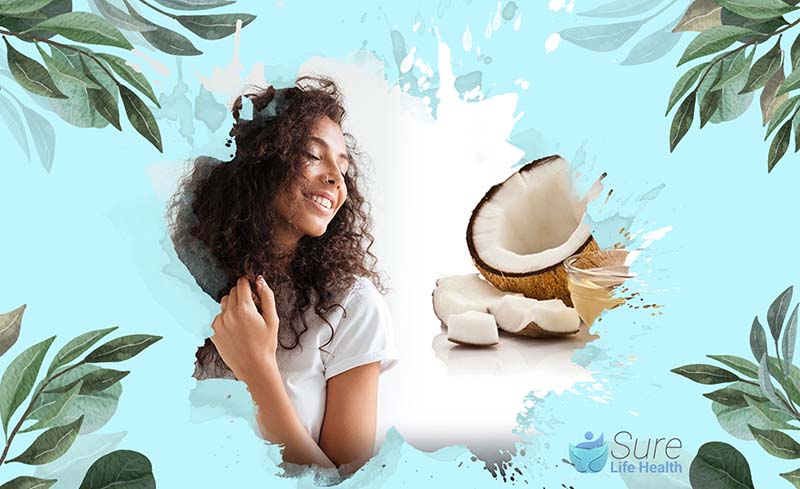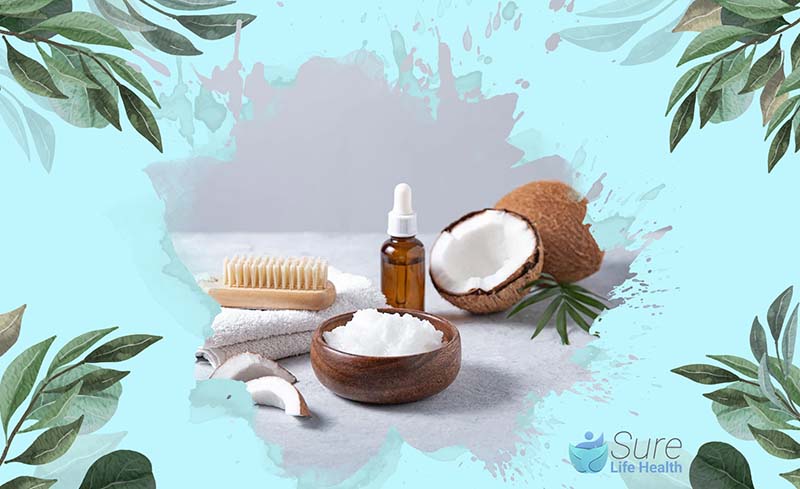Taking care of curly hair involves a unique and essential approach, tailored specifically for those with wavy, curly, or coily textures. Given the distinct needs of curls, they require specialized care and products to maintain their health.
Understanding the challenges unique to curly hair is crucial for enhancing and nurturing natural curls.
In this article, we explore the topic: “Is coconut oil good for curly hair?” and examine whether coconut oil is beneficial for those with curly hair types.
Is Coconut Oil Good for Curly Hair?
Coconut oil is a stellar addition to your haircare routine, ideal for anyone looking to boost their curly hair health. It deeply moisturizes curly hair, which often tends to be dry, by penetrating the hair follicles and hydrating from within, leaving your curls silky and luscious.
Additionally, it acts as a frizz-fighter, smoothing the hair cuticle to tame unruly flyaways and giving your curls a polished look even when you step outdoors. Not only does it enhance moisture and manageability, but coconut oil also strengthens the hair, increasing resilience against damage and maintaining vibrant, healthy curls. Moreover, it simplifies the styling process by defining curls naturally, reducing the need for extensive grooming efforts.

Benefits of Coconut Oil for Hair
While scientific research on coconut oil’s ability to accelerate hair growth remains inconclusive, its potential to enhance hair and scalp health is well-established, potentially giving the impression of faster growth.
- Fights Fungal Infections: A healthy scalp lays the foundation for healthy hair growth. Laboratory studies indicate that coconut oil possesses antifungal properties, which can aid in combating certain types of fungal infections. Its application may contribute to the treatment and prevention of dandruff and other scalp fungi, although further research is warranted to fully understand its efficacy.
- Calms Irritation: Rich in natural saturated fats, coconut oil exhibits soothing properties that can alleviate scalp irritation, flakiness, and itching. Moreover, its fatty content aids in sealing in moisture, promoting overall scalp health.
- Treats Split Ends: Unlike mineral oil and other oils, coconut oil has been found to penetrate hair strands effectively. This penetration capability may help reduce hair breakage and prevent split ends, potentially extending the time between trims. Additionally, coconut oil has been observed to minimize protein loss in hair, thereby preventing dryness, brittleness, and breakage.
- Protects from Heat Damage: Applying a small amount of coconut oil to damp hair before heat styling can serve as a protective barrier against both water and heat damage. Excessive water absorption by the hair, known as hygral fatigue, can weaken the hair structure over time, leading to dryness and increased susceptibility to breakage.

Tips for Using Coconut Oil in Hair Care
For optimal results, follow these steps when applying coconut oil to your hair:
- Choose Raw Coconut Oil: Opt for raw, unrefined coconut oil to harness its full nourishing potential.
- Application: Smooth coconut oil onto your hair, ensuring to cover all strands thoroughly. Use a comb to evenly distribute the oil, starting from the roots to the tips.
- Allow Absorption Time: Leave the coconut oil on your hair for at least 15 to 30 minutes to allow it to penetrate deeply into the hair shaft and scalp.
- Wash Thoroughly: After the absorption period, wash your hair thoroughly with a high-quality shampoo. You may need to shampoo twice to ensure all traces of oil are removed. Follow up with your regular conditioning routine.
Incorporating these steps into your haircare regimen will maximize the benefits of coconut oil, leaving your hair nourished, moisturized, and radiant.
Reasonable Frequency of Using Coconut Oil for Hair
According to research studies, applying coconut oil to your hair once or twice a week can help minimize damage such as hair breakage. For optimal results, haircare experts recommend using coconut oil a few times per week.
However, the frequency may vary depending on your hair type, with finer hair types potentially benefitting from less frequent usage. Experimentation and observation of your hair’s response can help determine the ideal frequency of coconut oil application for your specific hair needs.
Popular Ways to Combine Coconut Oil
Coconut oil stands out as one of the most versatile oils for hair care, offering multiple benefits as a pre-shampoo treatment, conditioner, styling aid, or mask. Here are simple methods to incorporate coconut oil into your hair care routine:
- Prewash Protector: Apply coconut oil to your hair before shampooing to prevent excessive water absorption, which can lead to damage and dryness. Focus on the midsection and ends of your hair, leaving the oil on for 15 to 30 minutes before washing.
- Conditioner: Coconut oil’s strengthening properties make it an excellent alternative to traditional conditioners. Use it on its own or mix a few drops with your regular conditioner to enhance its smoothing effects.
- Styling Aid: Combat frizz with just a small amount of coconut oil applied to damp hair. Ensure even distribution for easier absorption and styling.
- Hair Mask: Treat your hair to a deeply nourishing mask by massaging a teaspoon or two of coconut oil throughout your hair. Rinse it out after a few hours, or leave it on overnight for extra dry or damaged hair.

When Should You Avoid Using Coconut Oil Overnight on Your Hair?
While overnight application of coconut oil offers numerous benefits and is generally recommended for all hair types, there are instances when it’s best to avoid leaving it on for an extended period. Here are situations to consider:
- Naturally Oily Scalp: If your scalp tends to be naturally oily, applying coconut oil overnight may not provide significant benefits. The thick and viscous nature of coconut oil forms a layer on the scalp’s surface, potentially clogging pores and attracting dirt and dust. This can lead to counterproductive outcomes, exacerbating oiliness and potentially causing scalp issues.
- Excess Protein: Excessive protein exposure can contribute to increased frizz and hair damage. It’s advisable to consult with a hairstylist to assess your hair’s protein levels. If your hair already contains more protein than usual, adding coconut oil may worsen the situation rather than offering benefits.
Does Coconut Oil Have Side Effects on Hair?
Coconut oil is widely acclaimed for its benefits, but it does come with certain drawbacks, especially when used in hair care. One significant concern is for individuals with a coconut allergy, who may experience an allergic reaction to coconut oil. This is often seen with shampoos and other personal care items containing coconut oil, leading to allergic contact dermatitis.
For those with fine hair, coconut oil might not be ideal as it tends to weigh down strands, resulting in a limp, flat, and greasy appearance. Additionally, if used excessively, it can make coarse hair feel stiff and heavy due to buildup. Another potential issue is the clogging of pores, which some users report when applying coconut oil directly to the scalp.

Is Coconut Oil Good for Baby Hair?
Coconut oil is often recommended for baby hair care, particularly for treating cradle cap, a common condition characterized by crusty, oily, or scaly patches on a baby’s scalp. The moisturizing properties of coconut oil can help loosen the crusty flakes associated with this condition.
To use, simply apply a small amount of coconut oil directly to your baby’s scalp, leave it on for about 20 minutes, then rinse it off. Following the rinse, use a soft brush to gently comb through your baby’s hair and remove any loosened flakes.
Conclusion
Coconut oil is widely praised for its multiple benefits for curly hair, such as strengthening strands, preventing dandruff, and minimizing damage. It is versatile enough to be used in various ways, including as a prewash treatment, conditioner, hair mask, or styling aid. When starting to incorporate coconut oil into your hair care routine, it’s wise to begin with a small amount to see how your hair and skin react. If you experience no adverse effects, you can apply the oil two to three times a week for the best results.
Moderation is crucial—use just a teaspoon per application, focusing on the midsection to the ends of your hair. For the most effective and natural care, choose unrefined coconut oil, which retains more of its beneficial nutrients. So, addressing the question “Is coconut oil good for curly hair?”—yes, its attributes make it an excellent choice for maintaining healthy, vibrant curls.
Be sure to explore more insightful blogs from Sure Life Health, where we continue to shed light on the latest trends and breakthroughs in health and wellness.
Professor Gaye Cunnane, PhD, MB, FRCPI
As the Director of Health and Wellbeing at RCPI, Professor Gaye Cunnane is at the helm of initiatives aimed at enhancing the health and well-being of RCPI Trainers and Trainees. Her role extends beyond administration; she is also a respected clinical professor of rheumatology and a consultant rheumatologist at Trinity College Dublin (TCD) and St James’s Hospital. Prof. Cunnane’s medical journey began at TCD, where she graduated from medical school, and her path has been marked by both clinical and academic excellence.
After completing her basic clinical training in medicine, she embarked on PhD studies at University College Dublin and St Vincent’s University Hospital. Her research during this period was focused on prognostic markers in early inflammatory arthritis, a project that saw her collaborating with esteemed universities across Europe, including in Switzerland, The Netherlands, the UK, and Sweden.
Prof. Cunnane’s career took her to the University of California, San Francisco, where she spent three years delving into research on new treatments for lupus. Her academic prowess led her to the University of Leeds in 2001 as a senior lecturer, before returning to Ireland in 2003 to assume her current roles. She has also served as the National Specialty Director for Rheumatology training in Ireland, Programme Director for Basic Specialist Training with RCPI, and as a past President of the Irish Society for Rheumatology.
PUBLISHED ARTICLES
“Rheumatic disease differentiation using immunoglobulin G sugar printing by high-density electrophoresis”: Published in The Journal of Rheumatology, this study reflects her in-depth investigation into rheumatic diseases.
“Benefits of exercise in patients with rheumatoid arthritis: a randomized controlled trial”: This research work, highlighting the positive impact of exercise on rheumatoid arthritis, underscores Prof. Cunnane’s dedication to practical, patient-centered research.
Additionally, Prof. Cunnane has made notable contributions to the Annals of the Rheumatic Diseases, discussing early referral, diagnosis, and treatment of rheumatoid arthritis. She has also been involved in a study on the NCBI platform investigating exercise benefits in rheumatoid arthritis patients.
Professor Gaye Cunnane’s career is a testament to her commitment to improving patient outcomes in rheumatology through rigorous research, clinical excellence, and dedicated teaching. Her work continues to influence the field of rheumatology, both in Ireland and internationally.

